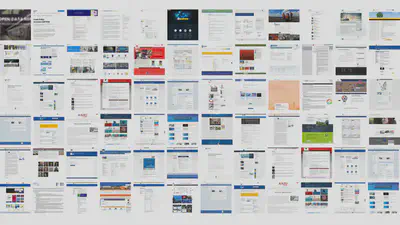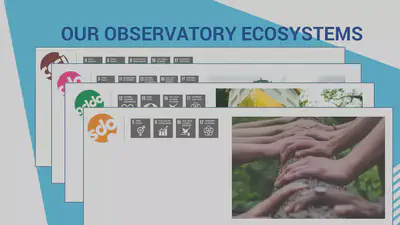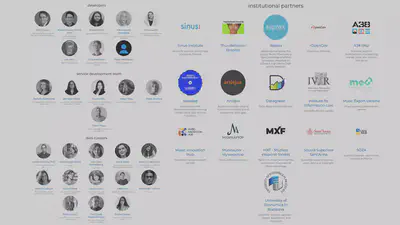About Data Observatories

Reprex’s data observatories are modern, 21st-century re-imagination of the observatory concept. In the 18-19th century, observatories were the centers of structured observation and data collection about the natural world. Since the 20th century, the EU and UN organizations created or acknowledged about 80 observatories ranging from natural sciences to social sciences and data observatories.
Table of Contents
New and maturing open data observatories
- Digital Music Observatory
- Cultural Creative Sectors Industries
- Green Deal Data Observatory
- Open Collections Net Digitized information and knowledge that is not shaped as datasets: books, texts, still images, sound recordings, films.
Watch Our 2-min Introduction with the example of music. (We do not only work with music data!)
⚙️/ Subtitles/ 🇳🇱 🇬🇧 🇧🇦 🇨🇿 🇭🇺 🇩🇪 🇱🇹 🇫🇷 🇸🇰 🇪🇸 🇹🇷 + Catalan.
Mission statement
, [slides](https://reprex.nl/slides/crea-innovlab-2023/).)](/media/slides/slider/big_data_creates_inequalities_centered_hue01680552b2db2fa8d53ded73c400dfd_65380_41ead3c5eae79d300eace39e8ca8f50d.webp)
Our observatories aim to help small businesses, NGOs, foundations, research groups, and universities that do not have a data engineering team and cannot finance large, proprietary data collection and processing programs in social sciences and digital humanities. We help them to access big data, poolin their research needs, and provide open-source access to research automation.
Data feminism: fighting the gender bias of AI is a blueprint to correct other forms of injustice
- Human- and machine-readable information about women is less quantity than men: the algorithm can find less suitable audiences for female writers and composers or suggests services or content to female readers.
Cultural and linguistic diversity: AI should not only benefit English-speaking countries and individuals
- As books, films, and music is increasingly sold by algorithms on global platforms, inventories and catalogs that are not perfectly machine-readable or not available in English are sidelined by the autonomous recommender or sales systems.
Competitiveness of SMEs, NGOs, small countries, small research groups
- Market, policy or scientific researchers who have no reliable access to big data assets and research automation become cannot compete with organizations that employ an army of data engineers, data scientists in research, innovation, or business development.
Services
 project tries to find new innovation and business models to fight this imbalance (➡️ [project page](https://reprex.nl/project/crea-innovlab-2023/), [slides](https://reprex.nl/slides/crea-innovlab-2023/).)](/media/slides/data-inequalities/10000_data_engineers_huff7295fe8ea66b91b041bfef1076a811_46930_a23c799942ae481f7461b5452673295b.webp)
- An open-source, linked, open data-driven platform for open science, open government, and the commercial use of open data-driven innovation.
- A governance model that complies with the European Data Governance strategy and regulations and provides a good practice of jointly exploiting data and knowledge among public and private, small and large organizations.
- An API that fuels a growing range of open-source scientific and statistical software.
- A data integration model that allows the joint exploitation of surveys, datasets, statistical data, and business indicators created by a citizen scientist, individual artists, small companies, research groups, and statistical authorities.
). We offer open-source scientific and statistical software to exploit our open data and knowledge (➡ [Reprex software](https://reprex.nl/software/) and [rOpenGov](https://music.dataobservatory.eu/authors/ropengov/).). We are working with an increasing number of innovators who place our open data and open-source software into more friendly, commercial apps which remain affordable for non-profit users (➡ join our [Data Observatory Labs](https://reprex.nl/project/crea-innovlab-2023/).)](/media/slides/observatories/innovation_dissemination_hub09959f08fbe9212817f598fe9e9d21f_51022_00f977cbda134dc1330e82963f4951a7.webp)
The observatories are open collaboration projects, following the principles of open-source software development, open science, linking open data, and the Open Policy Analysis Guidelines. The observatory partners collaborate on various projects that are either self-funded or granted. They jointly create datasets and databases, online collections of digital objects and knowledge, and open-source software.
History & Timeline
- 2014 CEEMID (2014-2020) is now the Digital Music Observatory(➡ project overview, multi-country research, survey harmonization, European best practice).
- 2018 First release of iotables, an reproducible research tool.
- why
- rOpenGov
- 2020 Automated data observatory product/market fit validation
- Early concept of an automated data observatory—blogpost with video.
- Product/Market fit development in the world’s second ranked university-backed incubator, the Yes!Delft AI+Blockchain Lab (➡ see announcement, Demo Music Observatory, Dutch AI Coalition.)
- First release of
retroharmonize, a survey recycling and harmonization tool for better, cheaper, collaborative surveying and data recycling (➡ announcement, benefits.)
- 2021
- Further concept development in the
JUMP Music Market Acceleratorprogram for the music observatory: (➡ announcement, closing) . - Green Deal Data Observatory concept
- Establishment of the
Cultural and Creative Sectors Industries Data Observatoryas a joint project of IViR (UvA) and Reprex ( website, announcement, collection().)
- Further concept development in the
- 2022
- Several small projects in the
- Open Music Europe:
- First release of statcodelists and early release of dataset, two R libraries to
- Audience Prize in
The Hague Innovators Challenge(➡ blogpost.)
- 2023
- Kick-off for
Open Music Europe - Data Observatories Lab
- Kick-off for
Governance & Budget
The observatories do have not a permanent budget, they are currently financed by Reprex and various user projects. Reprex will release a first business plan in June 2023 that contains a long-term public-private partnership plan based on financial, environmental, and social sustainability, and an ethical, inclusive, and open governance plan.
Read more on budgetary and goverance principles
We are considering mainly these documents when we are creating our first long-term business and governance plan:
- The Principles of Open Scholarly Infrastructure is an important source of inspiration for our plans. We will evaluate the suitability of this model, bearing in mind that our observatories will not only serve scholarly (educational and research) but commercial purposes, too.
- Open Data Directive is an important piece of EU legislation. Our observatories were designed to optimalize this legal instrument for in public benefit and for-profit use cases, too.
- Data Governance Act is a new EU law that aims to make more data available by regulating the re-use of publicly/held, protected data, by boosting data sharing through the regulation of novel data intermediaries and by encouraging the sharing of data for altruistic purposes. It enters into force in September 2023.
- Open Music Europe is an EU-funded project that aims to bring the Digital Music Observatory from a prototype to an EU-recognized, official European Music Observatory. We will experiment with a governance model that follows the EU’s helix-model to serve as a basis of further observatories.
- Contributor Code of Conduct is a voluntary code of conduct that all our individual partners, i.e., curators, developers and business developers must accept and follow.
Observatories

Please join one of our observatories:
- Digital Music Observatory: This is a maturing project with an increasing number of open and private data assets, users, stakeholders, aiming for an official EU recognition by 2025.
- Cultural Creative Sectors Industries Observatory: Our third observatory is currently seeking early collaborators and funded projects to further develop the idea and release a large enough number of data assets with use cases and publications. We want to create a momentum in 2023.
- Green Deal Data Observatory: Our second observatory is in an early stage, but the recent adoption of the CSRD Directive and the need for reliable environmental sustainability data will provide us with excellent growth opportunities.
- Social Sustainability Data Observatory: this project is in early concept phase.
- Competition Data Observatory: this project is in early concept phase.
- Open Collections Net: This project is in it inception phase, but it builds on many years of work with music-related collections.
More detailed overview here.
Join

Institutional
Private
-
Data curator: Help us curate data – tell us what sort of information is missing from your research agenda. Challenge us and collaborate with us in the crafting of valuable datasets that combine domain knowledge with reproducible, open data research practices (how?—contact.) -
Developer: the development works are currently carried out by Reprex and the Turku Data Science Group with open-source collaborators (more—contact.)